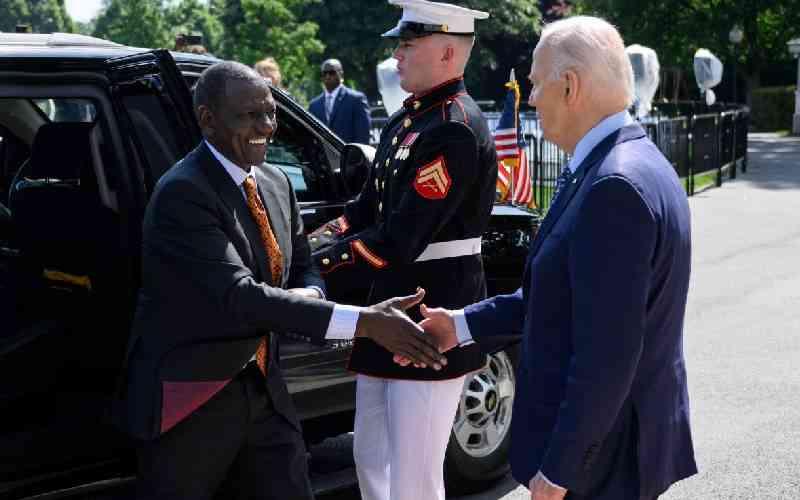I have been silently but professionally eavesdropping on common Mwananchi with regard to discussions on Kenyan politics more so with the current prevailing economic and political conditions and Kenya’s fortunes past the 2017 General Election.
I have had a significant gathering of tidbits here and there from a cross section of Kenya’s ethnic groups and economic classes. Well, the problem of tribe never stays far away whenever political, social and economic discussions arise. Moreover, it is more crudely manifested among the political class. It seems that the Kenyan psyche has that people value their ‘safety’, economic well being and they feel good by having one of their own accessing power and wealth.
Through gathering data, I have heard names floated around on potential leaders who could make a difference on Kenyan lives. Among those frequently mentioned is Peter Kenneth, whose legion of admirers feels he has touch of the economy and is visionary. Another one mentioned is Dr Mukhisa Kituyi. This is all picked from small talk people have in clubs, public places and even in some gatherings that I have attended. Obviously the loyalties to President Uhuru Kenyatta, Raila Odinga and William Ruto remain strong. Concerns are however growing over the reported or alleged fraud and other economic crimes variously referred to as corruption. Indeed the growing perception is that corruption is on the rise in national and county governments. Some of the figures mentioned on the money alleged to have been lost at the national level are mind boggling. This is worrying Kenyans.
The challenge however is that in Kenya, after many years of broken promises, many seem to be resigned to a belief that whatever is good for their tribal king is good for them despite the suffering. However, some current realities are slowly sinking in particularly for the youth who are slowly seeing their dreams become illusions. With soaring unemployment and increasing dependency on parents and relatives for daily upkeep, despite many of them having reached working age, many are under a lot of stress. This unsettled group which is growing rapidly is a cause of concern. Short term measures cannot help them as this is just postponing a problem that sooner or later, a social-political explosion looks a foreseeable risk. Part of the reason we have issues with alcohol abuse is linked to idleness and low level economic engagement by the group.
Nonetheless, we still need to be hopeful that we can change the nation’s fortune. Going by the small talk, I gather that there is a feeling that Kenya will get better and we will overcome the challenges we are engulfed in such as corruption. The throwing of names around is a way of saying that we deserve a better deal. However, what we should not lose sight of is that there are dynamics that we need to contain. Top among these is the prevailing tribalism and endemic poverty. Tribe in Kenya determines so much in terms of political support, access to jobs, where to set business and even where to marry and who to socialise with. Well, I have all along expected that the wealthier or more educated people are the less tribal inclined they are. This however does not work for majority of us. The blindness of tribalism is a disease that is difficult to cure in the Kenyan culture. Cross culture marriages and socialisation are happening and growing in Kenya but the deep tribal feelings have been difficult to eliminate and this informs the nature of political participation, voting and the political formations. Ignore these dynamics at your peril.
The beauty is the prevailing culture will not last forever. At the rate at which the media is growing more so the social media (with all its attendant shortcomings in usage), the young especially will spur a new dispensation. lt will also be fraught with mistakes but going by what I see and feel on the ground, Kenya will be fundamentally changed in the next five to ten years . Status quo in culture will be greatly challenged.
 The Standard Group Plc is a
multi-media organization with investments in media platforms spanning newspaper
print operations, television, radio broadcasting, digital and online services. The
Standard Group is recognized as a leading multi-media house in Kenya with a key
influence in matters of national and international interest.
The Standard Group Plc is a
multi-media organization with investments in media platforms spanning newspaper
print operations, television, radio broadcasting, digital and online services. The
Standard Group is recognized as a leading multi-media house in Kenya with a key
influence in matters of national and international interest.
 The Standard Group Plc is a
multi-media organization with investments in media platforms spanning newspaper
print operations, television, radio broadcasting, digital and online services. The
Standard Group is recognized as a leading multi-media house in Kenya with a key
influence in matters of national and international interest.
The Standard Group Plc is a
multi-media organization with investments in media platforms spanning newspaper
print operations, television, radio broadcasting, digital and online services. The
Standard Group is recognized as a leading multi-media house in Kenya with a key
influence in matters of national and international interest.







